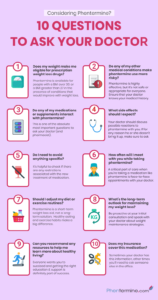Considering Phentermine? 10 Questions to Ask Your Doctor
Thinking about asking your doctor for Phentermine?
Sometimes, it can be hard to know where to start. Still, study after study shows that open and constant communication between doctors and patients improves medical outcomes. Questions can help your doctor better understand your concerns and provide superior care. Coming prepared with questions to ask your doctor is also one of the best ways for you, as a patient, to stay actively involved in the care process. It helps reduce medical errors and ensures the health professionals address your most critical concerns to the best of their ability.
So, we’ve included a few ideas for questions to ask your doctor at your first appointment! Also, make sure to write a few of your questions related to your specific doubts or concerns. Some patients hesitate to ask questions because they don’t want to bother the doctor, but don’t be shy – it’s better to be informed. We’re sure your doctor would agree!
Questions to Ask Your Doctor About Phentermine
Here are 10 questions to ask your doctor at your first appointment:
1. Does my weight make me eligible for prescription weight loss drugs?
If you’re not sure how to bring up the idea of phentermine (or prescription weight loss drugs in general), this is a great place to start! Body Mass Index, or BMI, is a primary prescribing criterion for weight loss medications. BMI is a measure of your weight relative to your height.
Phentermine is available for people with a BMI over 30 or a BMI greater than 27 in the presence of conditions that would improve with weight loss (e.g., type 2 diabetes, controlled high blood pressure, etc.). To calculate your current BMI before making an appointment, click here.
If your BMI is less than 27, prescription weight loss drugs aren’t right for you. Instead, consider a dietary supplement like Phen Caps to boost your weight loss.
2. Do any of my other medical conditions make phentermine use more risky?
Phentermine is highly effective for weight loss, but it’s not safe or appropriate for everyone. Double-check with your doctor and pharmacist before starting phentermine, especially if you have any of the conditions listed below.
This medication should not be taken if you are under 18, pregnant, or nursing. It’s also not suitable if you have uncontrolled high blood pressure, cardiovascular disease, hyperthyroidism, glaucoma, or a history of substance abuse or agitated states. If you have diabetes or kidney problems, your doctor will evaluate on a case-by-case basis if phentermine is safe for you.
3. Do any of my medications or supplements interact with phentermine?
Phentermine – like most medications – can interact negatively with other prescription and over-the-counter (OTC) medicines. So, just like you double-checked about other medical conditions, it’s vitally important that you verify that none of your current or recent medications or supplements interact with phentermine. This is one of the most important questions for your doctor (and pharmacist).
You should never take phentermine at the same time as MAOIs or within 2 weeks of stopping MAOIs. The combination can cause dangerously high blood pressure. Other medications that should not be combined with phentermine unless specifically prescribed by the same doctor include (but are not limited to) other weight loss medications, antidepressants (SSRIs and tricyclics), amantadine, amphetamines, caffeine pills, chlophedianol, cocaine, asthma & cold medicines, allergy medicines, methylphenidate (e.g. Ritalin), and nabilone. Phentermine may also combine poorly with some OTC supplements. As a result, you must inform your doctor of all current medications and supplements and their dosages before starting phentermine.
4. What side effects should I expect?
While taking phentermine, you may experience a range of mild to severe side effects. Your doctor should discuss these with you. So, if for any reason he or she doesn’t talk about side effects, make sure to ask. Your pharmacist can also discuss these possible reactions with you.
Severe potential side effects of phentermine include pulmonary hypertension or valvular heart disease. Seek immediate medical attention if you experience chest pain, trouble breathing, fainting, swelling of feet or lower legs, or difficulty in carrying out day-to-day activities. These feelings could be symptoms of a serious side effect.
More common side effects include a change in sexual desire, constipation, diarrhea, dizziness, dry mouth (xerostomia), headache, insomnia, mood changes (including anger or depression), nausea or vomiting, rapid heartbeat, stomach pain, tiredness, or an unpleasant taste in your mouth. While these are all normal reactions to some extent, if you feel the side effect is especially bothersome or persistent, speak with your prescribing doctor.
5. Do I need to avoid anything specific?
Whenever a doctor starts a new course of treatment, it’s helpful to check for any restrictions associated with the latest treatment or medication. In the case of phentermine, there are some well-defined things to avoid.
You should not drink alcohol while taking phentermine. The medication interacts with alcohol and can increase the risk of side effects. You should also take care to limit or avoid caffeine. Phentermine is a powerful stimulant, so it’s not ideal to combine with uppers. Also, avoid additional medications or supplements if you haven’t cleared them with your doctor and pharmacist first.
6. How often will I meet with you while taking phentermine?
As we said at the beginning, open communication is key to high-quality care. A critical part of care when you’re taking a medication like phentermine is face-to-face appointments with your doctor. These meetings are essential both as a medical check-up and as an opportunity for you to voice any concerns.
So, ideally, you should meet with your doctor at least every 30 days. Some doctors will require you to come in more often to monitor progress, but if your doctor is not planning to see you at least once a month, that may be a red flag. If he or she does not give you a set follow-up date, see if you can schedule monthly appointments independently.
Also, ask how to contact him or her between appointments. This is essential information if you have any questions or concerns about phentermine after you go home.
7. Should I adjust my diet or exercise routines?
A central phentermine myth is that these little pills contain some miracle substance that acts as a substitute for a healthy diet and exercise. Nope. Phentermine is a short-term weight loss aid, not a long-term solution. As a result, you must take the initiative to incorporate long-term lifestyle changes – like portion control and regular physical activity – into your daily routine. Not only will you lose more weight while taking phentermine, but you’ll also be more likely to keep it off!
So, the answer to this question should always be yes. Prescription weight loss drugs work best when combined with healthy, sustainable lifestyle changes. Bonus points if this question starts a more in-depth conversation with your doctor about healthy living!
8. What’s the long-term outlook for maintaining my weight loss?
In close connection with question #6, ask your doctor about his or her long-term plan for helping you reach and maintain a healthy weight. About 80% of people who lose weight regain it. This is because they view weight loss and their diet as a phase that will eventually end and inevitably fall back into unhealthy habits. Instead, be proactive at your initial consultation and speak with your doctor about long-term weight maintenance strategies.
If your doctor has a plan, take this opportunity to discuss it with him or her. Is it realistic for you? Do you need additional support (e.g., from a dietitian or a nurse) to reach those goals? If so, let your doctor know now.
If your doctor doesn’t have a plan, take this opportunity to discuss one. Question #9 is a great place to start.
9. Can you recommend any resources to help me learn about healthy living?
Speaking of weight maintenance and additional support… Ask your doctor if he or she can offer you any resources to help you learn about healthy habits. This may include anything from pamphlets to professional referrals to support groups. Many weight loss clinics (as well as primary care doctors) contract the services of a Registered Dietitian Nutritionist (RD or RDN) who can help you learn about healthy eating and makeover your diet. Depending on the clinic, they may also have physical therapists, exercise specialists, or support groups to help you along your weight loss journey.
If you’re interested in these services, don’t be shy about letting your doctor know! Everyone wants you to succeed, and getting the proper education & support is part of success. If cost is an issue, bring that up as well. The office or clinic may have a free (or cheaper) alternative to achieve some of those same results.
10. Does my insurance cover this medication?
Some insurance plans cover all weight loss pills, while others cover none. Some cover only specific brands. So, it’s essential to know how much will or won’t be covered to estimate how much the prescription will cost you monthly. Sometimes your doctor has this information, other times you’ll need to ask someone else in the office. Regardless, it’s worth your while to find this answer before leaving the doctor’s office.
Even if your insurance doesn’t cover phentermine, generic pills are relatively affordable. A 30-day supply of generic phentermine 37.5 tablets costs about $20-30 USD, based on recent estimates. Brand-name options are significantly more expensive. If you’ll be paying out of pocket, make sure your doctor is aware before he or she writes the script.
As we mentioned, these are just some of the many possible questions for your doctor. For example, you may also be curious about alternative treatments, allergies, or long-term benefits of phentermine or weight loss. No matter the question, concern, or doubt, voice it at this first appointment with your doctor.
What other questions did you ask at your first appointment? Or what do you wish you’d asked? Share with us in the comments section below!
Did you like the article?
Subscribe to our weekly newsletter and get our best weight loss tips straight to your inbox!









